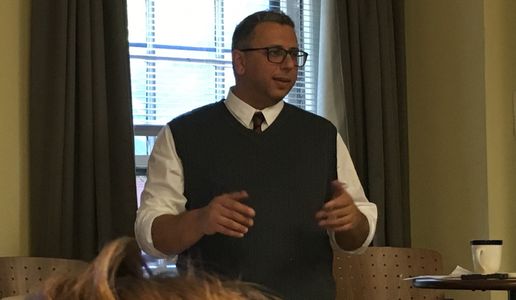Research Seminar Explores Climate Change Adaptation

Ali Dehlavi, an economist who works at WWF-Pakistan presented a research seminar jointly organized by the Frederick S. Pardee Center for the Study of the Longer-Range Future and the Frederick S. Pardee School of Global Studies at Boston University on October 7, 2015. The seminar, titled “Climate Change Adaptation in the Indus Ecoregion: a Practitioner’s Take on Empirics,” focused on lessons from econometric studies of climate change adaptation in the Indus Ecoregion of Pakistan.
Ali Dehlavi presented the findings of various streams of research he has undertaken in the Indus ecoregion of Pakistan. This included the findings of a major research project on Climate Change, Social Vulnerability and Food Security in Pakistan which was supported by the Canadian development research agency International Development Research Center (IDRC | CRDI). Dr. Adil Najam, Dean of the Boston University Pardee School was the Lead Investigator for this research project.
The main findings of this research can be found here. A short video summarizing the findings presented at the seminar can be found here.
Ali Dehlavi highlighted the challenges of climate change adaptation in Pakistan and presented the findings of what it would cost farmers. In particular, the main finding is that “in 25 years’ time productivity of land would reduce by 8-10% or by up to Pakistan Rupees 30,000 per acre in Punjab and Sindh (in Pakistan) owing to Climate Change, but gains in yield of up to 52% can be achieved if non-adapters were to adapt .” The implications of this finding is:
The impact of implementing on-farm adaptation strategies is estimated for three of the most important crops grown across Sindh and Punjab provinces: wheat, rice, and cotton. There exists significant positive benefits from adaptation for most of the farmers in the sample. For those that actually adapted, productive benefits are positive for wheat and cotton, but not significantly different from zero for rice. For those that did not adapt, the gains from adapting to climate change for all crops are predicted to be large. These findings provide evidence that the use of strategies to adapt to climate change can have a positive impact on food security.
Ali Dehlavi is an economist who works for WWF-Pakistan, was trained at University College London, and whose work focuses on applying economic valuation analysis to environmental challenges, especially climate change.